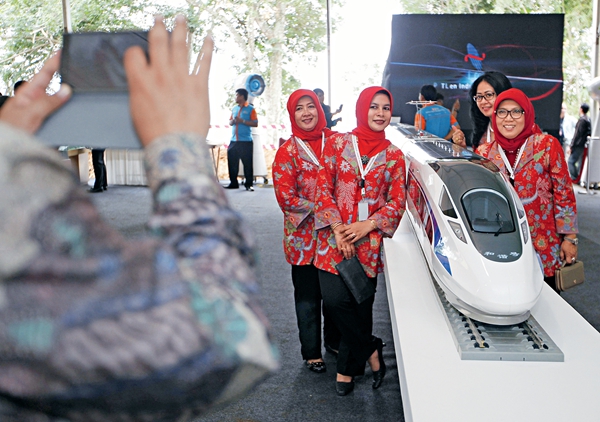China’s world-class high-speed rail network
China Today, April 26, 2017 Adjust font size:
Going Global
The globalization of China’s high-speed rail industry serves to support the roll-out of the Belt and Road Initiative. In Asia alone, travel speeds of 300 km per hour will make most Asian cities reachable within 24 hours. In addition to logistics and cost advantages, there is also the conventional advantage of freight transportation.
|
|
| The groundbreaking ceremony of the Jakarta-Bandung (JB) line in Indonesia is held on January 21, 2016 in west Java. Visitors pose for a group photo with the model of a high-speed train. |
Several multinational projects are underway, such as the Jakarta-Bandung line in Indonesia, the Moscow-Kazan line in Russia, and the Kuala Lumpur-Singapore line.
Take the Jakarta-Bandung (JB) line in Indonesia as a case-study. Construction started at the beginning of 2016. This line has 150 km of high-speed tracks, linking Indonesia’s capital to its fourth largest city. Its highest speed is designed to reach 350 km per hour and the line is expected to become operational in three years. The journey between the two cities will take just 40 minutes instead of the present three hours.
This line not only exports China’s industries, but also brings benefits to people along the Belt and Road routes and promotes the development of local industries such as the rail industry. Mr. Soemarno from Indonesia’s Ministry of State-owned Enterprises said that the JB line will create new economic growth zones along its tracks, and lay foundations for the building of a future Jakarta-Surabaya line.
The Mayor of Bandung added that Bandung is a service-oriented city reliant on commerce and trade, investment and tourism. The JB line will bring 10 times as many people as before, which will be a big boost to the city’s economy.
“At present, there’s no rail transit in Bandung, and the city’s annual growth rate is 8.8 percent,” he said. “I’m confident that this figure will surge to over 10 percent when the JB high-speed railway and light rail transit system become operational.” The JB high-speed railway is expected to drive the development of smelting, manufacturing and infrastructure construction in Indonesia, thus bringing more work opportunities and fuelling the upgrade of its industrial structure.
